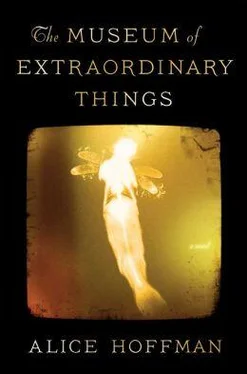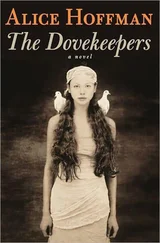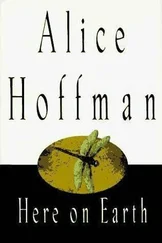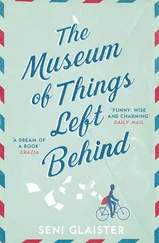I should have remained aloof from someone else’s misery as I was on most occasions, yet I was drawn in. Weiss was an older man, dressed in the black clothing of the Orthodox, but he was hardly timid. He had gone to all of the authorities, stationed himself in the corridors of Tammany Hall, where he was ill treated and berated. He had brought his story to reporters at the Yiddish newspaper, the Forward, on East Broadway, as well as to the English-language daily the Sun, but they had failed to look into his daughter’s disappearance. Only when all other efforts had been unsuccessful had he come to me, the finder of what was lost. He believed I had abilities granted by God.
I agreed to do as he asked because he was a man so unlike my father.
And perhaps I did have a gift, as Hochman always said, for I knew how men’s minds worked. When I imagined myself in their circumstances I could think the way they did, no matter how different their lives might be from my own. I became a criminal, a forger, a philanderer. I played out my desires in these various guises, and therefore came up with a map of where I might hide if I were such a person, how I would occupy my time, and on which vices I would spend my money. This turn of my imagination had helped me as a boy in my ability to find men who thought they had escaped detection. But now, in my search for Hannah Weiss, I found myself lacking in skill and soon enough came to an impasse. My usual ability to uncover a person’s innermost self failed me. Even when Hannah’s sister took me to their haunts—Miss Weber’s hat shop on Twenty-second Street; the shul where they worshiped; Madison Square Park, where they fed pigeons on Sundays—I found no clue. Hannah seemed a sweet, pretty girl, hardworking and loyal. But in my background, I had no practice with such people. Good, trustworthy individuals were strangers to me, mysterious in their small desires.
I spoke with several survivors, girls who had known Hannah, in the hope they would help me uncover who she was. I took notes in a small leather-bound book where I kept my appointments jotted down. Her friends spoke with hushed voices when they talked of the fire that had moved through the workroom. It came upon them like a swarm, one survivor told me, red bees bursting through the wall. Many of the girls who had escaped thought Hannah, too, had survived, but it turned out it was Ella they had seen, for the sisters looked so alike it was nearly impossible to tell them apart, especially on that smoky afternoon.
As far as I could tell there was nothing unusual about Hannah—no secrets, no flaws. But perhaps everyone has a secret life, and on the last day of my interviews, I discovered someone who knew more about Hannah than the others. This survivor asked me to refer to her in my notes only as R, the first letter of her name. She didn’t wish to be in the public eye, and feared the fierce determination of the press. The building where her family lived had been circled by reporters after the tragedy. She had been hysterical for over a week, unable to speak or understand what was said to her. Still reporters called out her name from the street when her parents refused to have her interviewed. R was too distraught to be in our world, a place where she had seen her two younger sisters perch like doves upon the ledge of the ninth floor. She had told her sisters to go on without her, and she went back for her new coat, cranberry-colored wool. By then the smoke was everywhere and the elevators were no longer running; she had managed to grab hold of the burning ropes in the elevator shaft by throwing her coat around the sizzling twine so her hands wouldn’t burn as she lowered herself down.
She ran outside, and she saw her sisters on the ledge when she looked up. She thought that they saw her as well, for one tossed down her ring, as a gift and a keepsake. Unfortunately, the speed that carried it had embedded the ring in the sidewalk; the silver had been flattened, becoming a part of the concrete. R blamed herself for not catching the memento, though it would have likely burned her hand, perhaps even broken the small bones of her fingers.
R’s parents only allowed me to speak to their remaining child because Mr. Weiss had contacted them and vouched for me, and because they knew of his predicament. When I agreed not to use their daughter’s name in any way, and swore I would not upset her, I was at last invited to their home. Time was passing, and I knew from my work with Hochman that after twenty-four hours a missing person was half as likely to be found, and after a week, the chances were slimmer still. We were now passing the two-week mark, a very bad portent for recovery. Hochman always said that in two weeks a man could completely refashion his history; he could walk all the way to Ohio or Iowa, change his name and his accent, disappear into another life. In the woods, footprints faded, the wind rose up to disperse shreds of clothing, flesh became grass.
I sat in an unfamiliar parlor on East Thirteenth Street. The room was close, and there were rollaway cots that had been covered with white sheets, the beds where R’s sisters had slept. A sheet also covered the mirror on the wall, as was always the case during mourning periods. R was nineteen and had been burned on her arms and legs. The skin was red and mottled now, coated with a healing gel of aloe and fish oil. She had been a pretty girl, but now she seemed ravaged, not just by the effects of the fire on her body but by the memory of all she had seen. She told me she had no wish to be awake. There were days when she slept for eighteen hours or more, doing her best to bypass time completely.
“Did I deserve this?” R asked me. Her voice was so young and plaintive I felt only a fool would dare to respond. Who was I to remark upon her life? All the same I made a comment I thought might ease our conversation. I told her no, she did not deserve her fate, and if there was a God, something I myself doubted, then he had made a terrible mistake.
She laughed hoarsely and said, “God has nothing to do with this. It’s men’s greed that made this happen.”
Her mother was watching from the hallway, to ensure I didn’t tire R or upset her by dredging up memories of March 25. I recounted what I had so far learned of Hannah Weiss. R’s eyes were lowered as I spoke. When I finished she lifted her gaze to meet mine.
“They didn’t know her completely,” R said. “I was her closest friend.”
I signaled to the mother then, and asked if she would bring us tea. She had been suspicious of me from the start and had insisted I leave my camera in the front hall. Now she looked at R with an uneasy expression, but R merely said, “I’ll be fine with him. We could use the tea for our parched throats.”
When her mother went down the corridor, I asked R what she meant.
“Hannah went to labor meetings and didn’t tell her father. Mr. Weiss was strict. She knew he would fear for her safety. He would have never allowed her to risk going to prison. I saw her once with several strikers outside another factory on Great Jones Street. She ran after me and made me promise not to tell. So I gave her my promise. She hugged me to thank me. She said, I’ll remember this.”
“Even if her father wouldn’t approve, there’s nothing so unusual in any of that,” I countered.
“She wasn’t alone. She was with a man. She started going to union meetings with him. I think she was in love with him.”
I leaned forward, interested. “And you knew this because?”
R laughed at me. I think she definitely took me for a fool. “From the look on her face.”
Читать дальше












